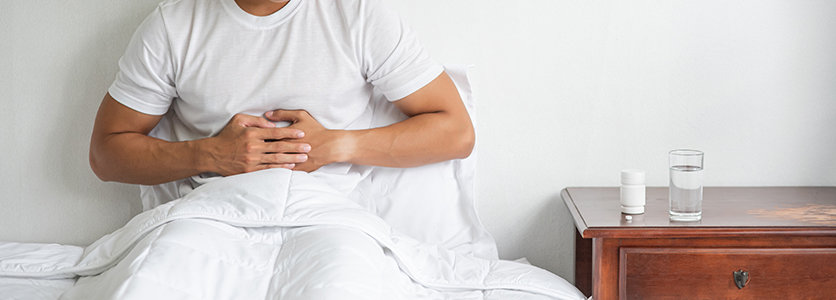Did you know that colorectal cancer is the most common cancer among Malaysian men and the second most common cancer among Malaysian women? Overall, it is the third most common cause of cancer deaths in Malaysia, according to a research carried out by a collaboration of varsities in 2020 under the Be Cancer Alert Campaign. Let’s find out more about Colorectal Cancer from Dr. Yong Yuen Geng who is the Consultant General & Colorectal Surgeon at Columbia Asia Hospital – Setapak.

Which part of the colon does most cancer occur?
First, let’s take a look at the entire makeup of the large intestine. It consists of cecum, ascending colon, transverse colon, descending colon, sigmoid colon and rectum. The left colon which is the descending colon, sigmoid colon and rectum, make up about 70 percent of colorectal cancer. Cecum and ascending colon comprise 20 percent of all colorectal cancers while transverse colon makes up 10 percent of all the cases.
How is colon cancer diagnosed?
Colorectal cancer is confirmed through a biopsy for a histopathological examination obtained during a colonoscopy. Occasionally, the diagnosis can only be confirmed after the histopathological examination of the tumor in the excised colon.
Are there any symptoms of colon cancer patients can look out for?
Early colorectal cancer may not show any symptoms. When the tumor grows, it may result in symptoms such as altered bowel habits, passing blood in stools, abdominal pain or discomfort or bloating, and an urge to open bowel even though the bowel is empty. Other symptoms include unintentional weight loss and loss of appetite.

What are the risk factors of colon cancer?
The risks of colorectal cancer are an unhealthy diet, lack of physical activity, obesity or being overweight, lack of dietary fiber, heavy alcohol consumption and smoking. Diets rich in refined carbohydrates, red and processed meats are also associated with a higher risk of developing colorectal cancer. Personal or a family history of colorectal cancer or adenoma, hereditary gene mutations or syndromes, carry an increased risk of colorectal cancer. So does chronic inflammatory bowel disease such as Crohn’s disease and Ulcerative Colitis.
What is the recommended age for getting screened for colon cancer?
As more than 70 percent of colorectal cancer cases in Malaysia are, unfortunately, diagnosed late at stage three and four, it is imperative to undergo screening for early detection and prevention of colorectal cancer. The recommended age for screening of colorectal cancer was 50 years old previously. However, evidence has shown that the age should be reduced from 50 to 45 years old due to increasing incidence of colorectal cancer in younger populations. If there is a first degree relative (siblings, children or parents) with colorectal cancer, you are recommended to undergo screening colonoscopy at an age 10 years before the age of diagnosis of colorectal cancer of the first degree relative or at 40 years old, whichever comes first. Colonoscopy is not only a good diagnostic procedure, but it is also a preventative procedure for colorectal cancer as your doctor will also normally excise the polyps detected during the colonoscopy. Polyps are precancerous swellings in the inner lining of the large intestine from which colorectal cancers arise.
How do you prepare for a colonoscopy?
On the day before the colonoscopy, you are allowed to have only plain or fish porridge, plain white bread and clear fluids. And then you will be given laxatives to be taken on the night before and the morning of the colonoscopy for bowel evacuation. You are then expected to pass only clear watery contents without any residue before the colonoscopy examination. This is because it is important to have a well-cleansed bowel prior to the colonoscopy so that the view during the colonoscopy is not obscured. Your doctor will also advise you to stop taking any blood thinners or any supplements with blood thinning effects, a week prior to colonoscopy. This is to minimize the risk of bleeding due to the blood thinning effects of the medications.
What should you expect on the day of a colonoscopy?
Usually you will be admitted into the daycare ward in the morning. The nurse will hand you a hospital gown for you to wear when you are at the ward. You will be given sedation prior to and during colonoscopy. A fibreoptic flexible tube with a light source and a camera on its tip is inserted through the anus to view your large intestine. This procedure usually takes about 30 minutes. Some patients may feel abdominal bloating during and after the colonoscopy. This problem will resolve after you pass wind. When you are fully conscious, your doctor will explain all the findings and the procedure, giving you the relevant advice regarding your condition. You will be discharged home in the same evening. You are advised not to drive home by yourself.
Will I need other tests before we can decide on treatment?
Once the colonoscopy and biopsy confirm the diagnosis of colorectal cancer, you will need to undergo a CT scan. Most likely an MRI scan too, in the case of rectal cancer, to determine the stage of the disease. Blood investigations including a baseline tumor marker, CEA, are obtained prior to the treatment.
Columbia Asia Hospital offers an extensive range of health packages. Learn more about our health packages.
This article first appeared in Natural Health, 28 March 2022.
Share:
Was this article helpful?
Share:
Was this article helpful?
Health Packages
Elevate your health with tailored health packages at Columbia Asia Hospital. Take charge of your health journey today.
Pink October 2024
From
RM80
AIA Policyholders Self-pay Benefits
Pink October 2025
From
RM80
HLA Policyholders Promo: Influenza Vaccination
RM65
Find Out More
